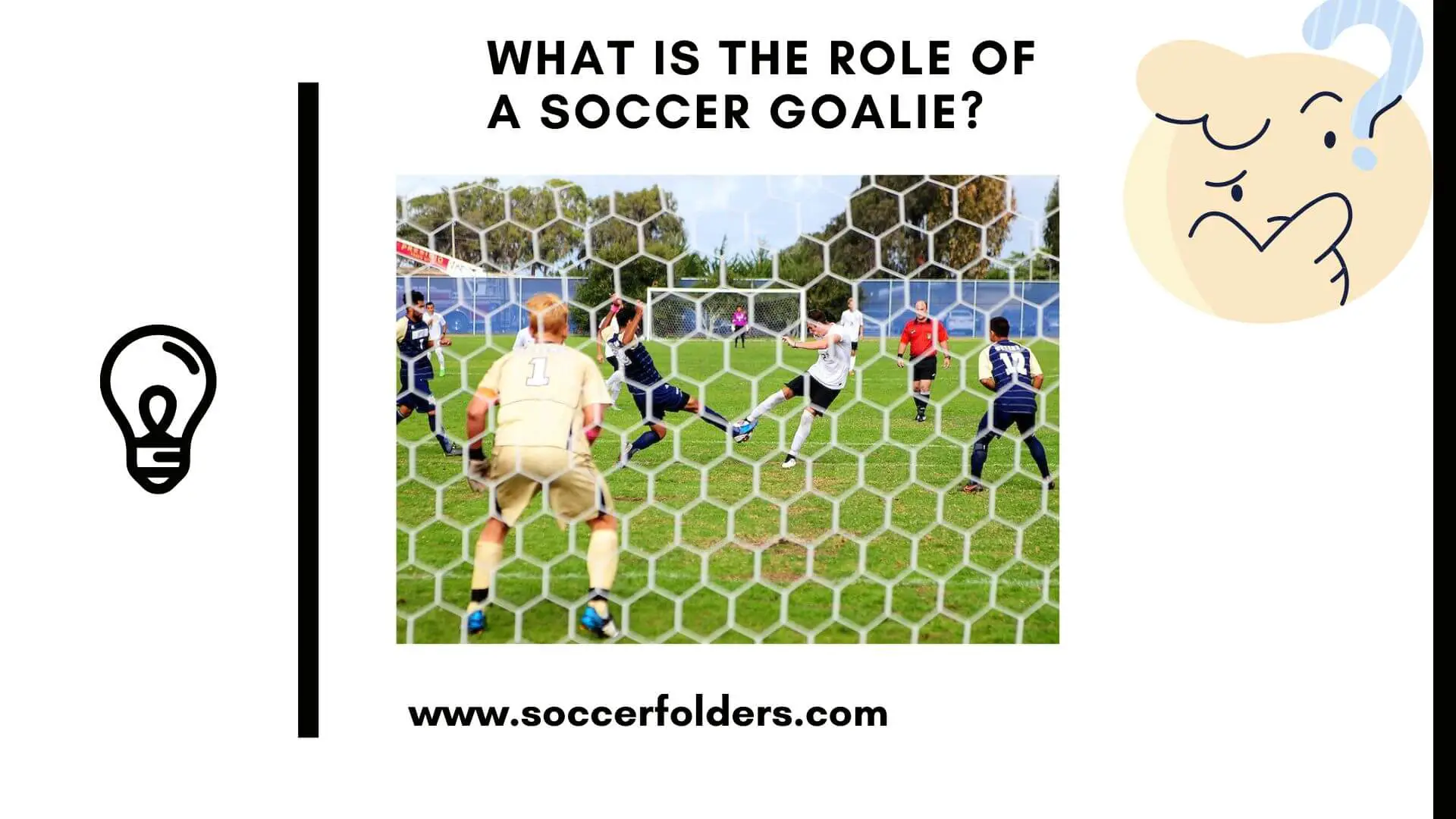What is the role of a goalkeeper in soccer?
Before answering that question, keep in mind that the goalie is the most important position in soccer.
Good goalkeepers are known for their quick reflexes, strong hands, and excellent positioning on the field. They are also expected to be leaders on and off the field, as they often play a crucial role in organizing the defense. In short, the goalkeeper is a crucial player and can make a huge difference in the outcome of a match.
In this article, you’ll find out the main role of a goalkeeper in a match.
Let’s get started.
Table Of Contents
What Is The Role Of A Goalkeeper?
The primary role of a soccer goalkeeper is to protect the team’s goal and prevent the opposing team from scoring. To do this effectively, a goalkeeper must be agile, quick, and have excellent reflexes. They must also have strong communication skills, as they often serve as the last line of defence and must coordinate with their teammates to protect the goal.
A goalie can have defensive and attacking responsibilities. Let’s see them.
You can also read the soccer goalkeeper tips for beginners.
Goalie Defensive Responsibility
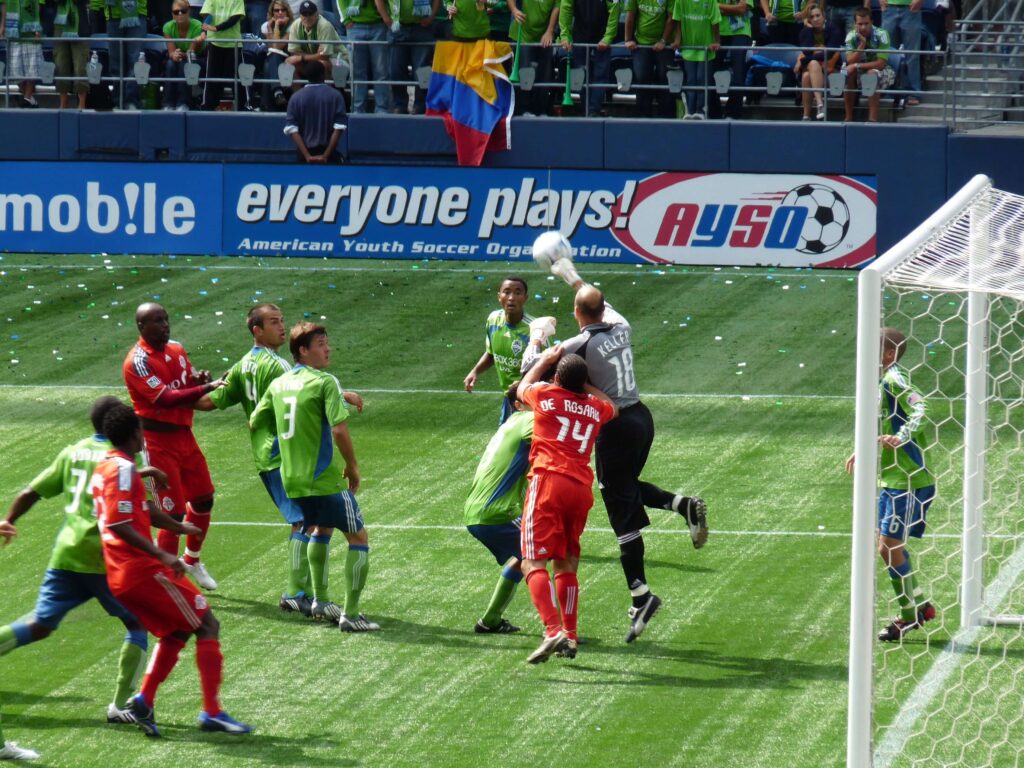
One of the main responsibilities of a goalkeeper is to catch or punch away shots on goal. This requires quick reflexes, as the ball can be moving at a high velocity.
Goalkeepers must also be able to anticipate the direction of the shot and position themselves accordingly.
In addition to catching or punching away shots, they may also be called upon to clear the ball away from the goal area using their feet or hands.
Another important aspect of a goalkeeper’s role is their ability to organize and lead their defenders. They are often the first player to see the developing play and must communicate with their teammates to ensure that everyone is in the right position.
This requires strong leadership skills. That’s why most goalies are often the team’s on-field captains.
Attacking Responsibility
In addition to their defensive responsibilities, goalkeepers are also expected to contribute to the team’s attacking play.
This can involve initiating counterattacks by quickly distributing the ball to a teammate, or by serving as an extra player in set-piece situations such as corners or free kicks.
There have been many goalies who scored either in a corner kick or set-piece situation.
For example, in 2021, Liverpool goalkeeper Alisson scored a goal in the last minute against West Bromwich.
Goalkeepers tend to bring that number into the opponent’s box whenever they are trying to win or equalize, and this often occurs in the last seconds of the game.
It would be too risky to do it when there’s still a lot of time in the game.
Mental And Physical Demand Of The Position
One of the most difficult aspects of being a goalkeeper is the mental aspect of the game.
Goalkeepers are under constant pressure to perform and must be able to bounce back quickly from mistakes. They must also be able to remain focused and composed in high-pressure situations.
To be successful, a goalie must be in excellent physical condition. They must be able to sprint, jump, and dive to make saves, and must have the endurance to play a full 90-minute match.
In addition to physical conditioning, they must also have excellent hand-eye coordination and be able to judge the flight of the ball accurately.
What Skills Does a Goalkeeper Need?
Goalkeepers require a unique set of skills to excel in their position and be the backbone of their team’s defense. These skills combine athleticism, mental fortitude, and technical abilities.
Here are the essential skills that make a goalkeeper successful:
1. Reflexes
Quick reflexes are a goalkeeper’s first line of defense. They must react swiftly to shots and deflections, making split-second decisions to block or catch the ball.
2. Shot-Stopping
Goalkeepers need excellent shot-stopping abilities to save shots from various distances and angles. This skill involves proper positioning, footwork, and a keen understanding of the opponent’s shooting tendencies.
3. Handling
A goalkeeper’s handling skills involve how they catch, hold, or punch the ball. They must be secure in their grip to prevent spills or rebounds that could lead to scoring opportunities for the opponents.
4. Diving
Diving is a fundamental skill for goalkeepers, allowing them to extend their reach and make acrobatic saves. They must dive confidently and with proper technique to cover more ground and reach shots that are out of their immediate reach.
5. Aerial Ability
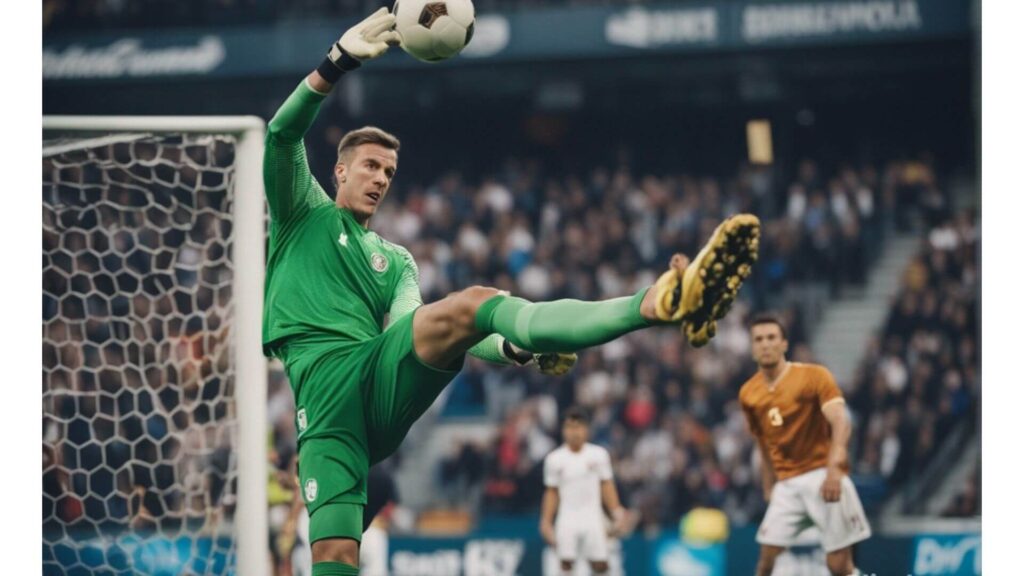
Goalkeepers often face high balls and cross into the penalty area. Their aerial ability involves commanding their box by confidently coming off their line to claim or punch away airborne threats.
6. Distribution
Goalies are increasingly becoming involved in the build-up play and team attacks. Good distribution skills allow them to initiate counterattacks quickly by distributing the ball accurately and efficiently to their teammates.
7. Communication
Goalkeepers are like conductors on the field, organizing and communicating with their defenders. Clear and concise communication ensures everyone is on the same page and can react swiftly to changing game situations.
8. One-on-One Situations
In one-on-one situations with an opposing attacker, goalkeepers need to be composed and patient. They must stay on their feet, read the attacker’s movements, and time their challenge to make a crucial save.
9. Mental Toughness
The role of a goalkeeper can be mentally demanding, especially when facing high-pressure situations like penalty kicks or late-game saves. Mental toughness allows goalkeepers to stay focused, bounce back from mistakes, and maintain confidence throughout the match.
10. Decision Making
Goalkeepers must make quick decisions in high-stress situations. They need to assess whether to stay on their line, come out to intercept, or rush off their line to close down an advancing opponent.
Read my full article about Decision Making in soccer here.
11. Footwork
Strong footwork is essential for goalkeepers, both in positioning themselves for shots and for playing with their feet. Quick and precise footwork enables them to move efficiently and maintain balance while making saves or distributing the ball.
Training For Goalkeeper
Goalkeeper training is a crucial aspect of developing a skilled and reliable goalkeeper.
The training sessions focus on enhancing various essential skills specific to the position.
Goalkeepers work on their reflexes by facing rapid shots fired from different angles. They practice diving to make impressive saves, protecting the goal like a fortress. Additionally, training includes footwork drills to ensure goalkeepers are quick on their feet and ready to react to sudden changes in play.
Coaches also emphasize improving goalkeepers’ positioning to be in the right place at the right time.
With regular and intense training, goalkeepers gain the confidence and abilities needed to be the last line of defense for their team.
You should also read soccer goalie training equipment to improve your game.
Goalkeeper Equipment
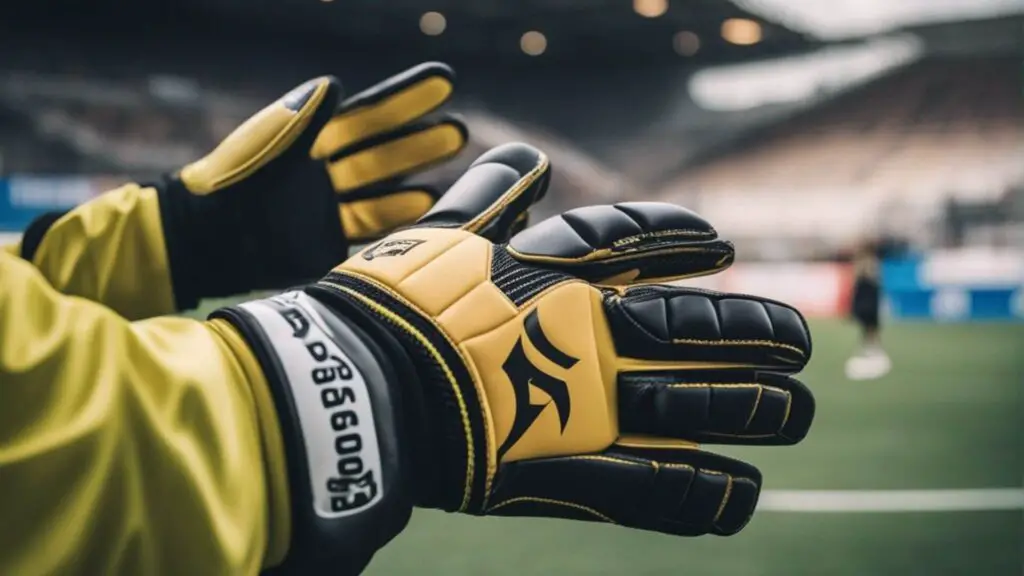
Goalkeepers wear specialized equipment to safeguard themselves and enhance their performance on the field.
The most notable piece of gear is their goalkeeper gloves. These gloves have special padding to cushion their hands when stopping powerful shots and provide extra grip to hold onto the ball securely.
Goalkeepers also wear padded clothing, such as long-sleeved jerseys and padded shorts, to protect their bodies when diving and blocking shots.
Some goalkeepers wear headgear for added protection, especially during aerial challenges.
The equipment not only ensures the goalkeeper’s safety but also gives them the confidence to fearlessly face any shot that comes their way.
Goalkeeper Tactics
Goalkeepers play a strategic role in the team’s overall tactics and defensive organization. They are the eyes and voice of the defense, constantly communicating with their teammates to maintain a strong defensive line.
In certain situations, goalkeepers may decide to rush out of their penalty area to intercept long passes or close down an onrushing attacker.
Their positioning is crucial, as they need to be well-placed to cut down angles and make saves.
Some goalkeepers also possess excellent distribution skills, allowing them to initiate quick counterattacks with precise throws or long kicks upfield.
The tactical decisions of a goalkeeper can have a significant impact on the team’s overall performance.
Scouting and Recruitment For Goalies
Scouting and recruiting goalkeepers is an important task for soccer/football clubs seeking to strengthen their squads.
Scouts look for young talents with natural goalkeeping abilities and potential for improvement.
They attend youth tournaments and matches, observing various goalkeepers’ performances to identify the most promising prospects.
The scouts assess attributes like reflexes, positioning, communication, and leadership skills.
Clubs also consider a goalkeeper’s height and physical attributes, as these can influence their shot-stopping abilities.
Once a potential talent is identified, the club’s recruitment team may approach the player and their parents to discuss the opportunities the club can offer for their development.
==>> Check out our quiz to find out your soccer/football position here.
Foul on Goalkeeper Rules
Goalkeepers enjoy a special level of protection under the “Foul on Goalkeeper” rules, as they are considered vulnerable players due to their unique role on the field.
These rules aim to safeguard goalkeepers from unnecessary and dangerous challenges that could lead to injury or hinder their ability to make saves effectively.
Here are some key aspects of the “Foul on Goalkeeper” rules:
1. Obstruction:
Opposing players are not allowed to obstruct or impede the goalkeeper’s movements inside the penalty area. Deliberately preventing the goalkeeper from releasing or reaching the ball is considered an obstruction foul.
2. Contact:
Any excessive or reckless physical contact with the goalkeeper, even if the ball is in play, can result in a foul being called. Players must be cautious when challenging for high balls to avoid collisions with the goalie.
3. Jumping and Landing:
If a goalkeeper is in the process of jumping to catch or punch the ball, opponents must avoid running into or making contact with them mid-air. Similarly, players should not challenge the goalkeeper while they are landing from a save or clearance.
4. Hands and Feet:
Goalkeepers have specific privileges when it comes to handling the ball. They are permitted to use their hands to control the ball within their penalty area. However, outside their designated area, they are subject to the same rules as outfield players.
5. Time and Space:
Players are expected to give the goalkeeper sufficient time and space to release the ball after making a save or gathering it. Opponents must not pressure the goalkeeper unfairly or attempt to block their distribution.
6. Penalty Kicks:
Fouls on goalkeepers inside the penalty area during regular play can result in a penalty kick being awarded to the opposing team. This is a significant consequence as penalty kicks provide an excellent opportunity to score.
7. Goalkeeper Possession:
Once a goalkeeper gains possession of the ball, opponents must not attempt to kick or snatch it from their hands. Doing so will be considered a foul, and the goalkeeper will receive a free-kick.
The enforcement of “Foul on Goalkeeper” rules is vital in ensuring the safety and fair play of the game.
Referees closely monitor goalkeeper-related incidents and take appropriate action to penalize fouls when necessary.
Understanding and adhering to these rules are crucial for players and teams to maintain a competitive yet respectful atmosphere during matches.
You can also read the rules of soccer simplified here.
Goalkeeper’s Role in Penalty Shootouts
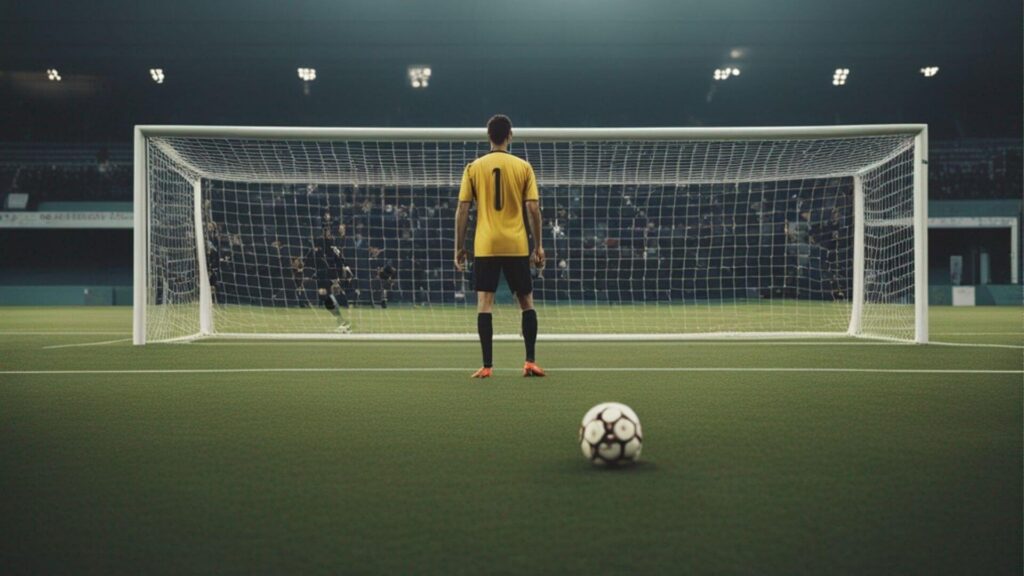
During penalty shootouts, the pressure on goalkeepers reaches its peak. It becomes a one-on-one duel between the goalkeeper and the penalty taker.
Goalkeepers must analyze the shooter’s habits and body language to anticipate where the shot might go.
They rely on quick reactions and instinct to dive in the right direction and attempt to make a crucial save.
Goalkeepers may also engage in gamesmanship, trying to distract the shooter or delay their run-up to disrupt their rhythm.
Penalty shootouts can be emotionally intense, and the goalkeeper’s ability to stay calm and focused can make all the difference between victory and defeat for their team.
Final Word
At the highest level, the role of a goalkeeper is extremely demanding and requires a unique set of skills.
They must be able to think and react quickly, have excellent reflexes, and possess a strong mental toughness. They must also be able to communicate effectively with their teammates and lead the defense.
With so much at stake, it is no wonder that the position of goalkeeper is considered the most important on the field.
You can also read the worst goalkeeper mistakes.

